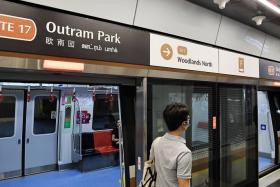It's a rail tough job
SMRT teams race against the clock every night to repair damaged train tracks
This article was first published in The New Paper on May 13, 2014.
It is well past midnight.
On an isolated stretch of train track the group of men, some masked, wait for the current to be cut before springing into action with their tools and blades.
Their mission? To remove and replace damaged sections of train track, fast - because in about three hours, the current will come back on and they must get off the tracks.
For Mr Yin Tuck Kam, this race against time is part of his typical day at work.
The 52-year-old assistant engineer estimates that most nights, his team of 12 replaces more than 56m of tracks — slightly more than the length of an Olympic-sized pool.
In 2013, after a spate of breakdowns, SMRT said it would be replacing some 40km of rails – about 10 per cent of the total 400km on the North-South and East-West lines.
They hope to achieve this within two years.
In 2012, they replaced 8km.

Mr Yin is part of SMRT’s Track Renewal Team, a group of about 100 workers who venture onto the tracks after train services have stopped to carry out inspections and repairs.
The last trains leave Pasir Ris and Marina Bay stations at 11:23pm and 11:40pm respectively, daily.
The New Paper was given an opportunity to see them at work.
We boarded the train at Ulu Pandan Depot and passed eight stations flashing “Do not board” signs, with workers assembling on the platforms, preparing to start work.
AFTER DARK
The workers, mostly locals in their 20s to 60s, ride the Consist, a diesel-powered locomotive with a crane and equipment attached to it.
In his 26 years working for SMRT, Mr Yin has visited every station on the East-West and North-South lines, usually after dark.
He rises at 8.30pm and goes to bed at 4pm, working from 10.30pm to 8am five days a week.
The father of two — a son, 13 and a daughter, nine — considers the odd hours a blessing and said: “It’s good to be in the night shift, I get more time to see my kids.”
Mr Yin and his team carry heavy equipment by hand.

The equipment weighs between 30 and 40kg.
It can be a struggle, but Mr Yin said they have to complete their task on time or train services the next day will be slowed.
Progress is also slow because the tracks are made of thick steel and in order to cut through a section of track — about half the width of this page — workers have to take turns handling heavy rail cutting equipment.
WET WEATHER
The tight schedule and the location of their worksites mean team members cannot go to the toilet for the three to four hours they are working.
If it rains, they have to shelter the tracks with an umbrella, said Mr Yin.
He said it is a tiring and dirty job.
In the early years, he had to crawl on his hands and knees and would often leave work with his hands black from grease and rust.

He said the public have complained about the noise they sometimes generate because they work at odd hours.
“Once, we were cutting a section of track at Queenstown when I heard someone yelling from below the tracks.
Turns out it was this guy was swearing at us because of the noise.
“We just ignored him,” he said. He said they did not have time to talk to him.
“When we work in the tunnels, we need to have the ventilation fans on, but sometimes residents complain about the noise and we are forced to switch them off,” he said.
However, the heat generated by their equipment is immense, with a welding torch producing heat of up to 2,000 deg C, and it gets hot and stuffy rapidly without ventilation in the tunnels.
Even though the worksite TNP visited along the tracks at Admiralty was open air, the smell and smoke from men cutting the tracks filled the air.
Mr Yin knows the public can be demanding.
“I don’t blame them. I wish they knew that these things are not within our control. We try our best to make sure everything works.”
Asked whether he considers the odd hours a sacrifice, he said in a matter-of-fact manner: “It’s not a sacrifice. I’m just doing my job to keep things running.”
Get The New Paper on your phone with the free TNP app. Download from the Apple App Store or Google Play Store now


